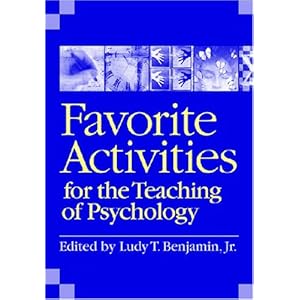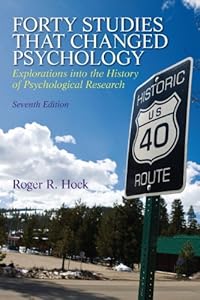The following is a combination post with new material from Chuck and reminders from Steve
There is an abundance of materials out there so you don't have to reinvent the wheel your first year (although you should feel free to after that). Here are some of the best resources to start with:

1) TOPSS stands for Teachers of Psychology in Secondary Schools and is part of the American Psychological Association. Join TOPSS and you become an affiliate member of the APA at a fraction of the cost that other professionals pay, only $50 per year.
*NEW* In 2011 teachers on the TOPSS board created a manual for new high school psychology teachers. This was written by high school psychology teachers who have "been there" with few resources and little help among your building colleagues. Be sure to check this out!
TOPSS has lesson plans for every unit of the high school psych course and is in the process of revising older units so that the lesson plans remain vital and useful. They're created by high school teachers and are edited by psych professors. There's also a quarterly newsletter, the Psychology Teachers Network, and an annual workshop for high school teachers at Clark University. Finally, and maybe most importantly, the APA and TOPSS have created the National Standards for High School Psychology. The first version of standards was created in 2005 and the newest version of the standards was released in 2011. (Full disclosure: I'm currently chair of the TOPSS Board.)
11) Chuck Schallhorn has a YouTube Channel that can help out with some of the more complex ideas for the students at: https://www.youtube.com/
13) We have a THSP Psychology folder on Google docs that has many resources for each unit. These activities have been vetted and are appropriate and quality lessonshttps://drive.google.com/open?
14) When planning a new unit, check out this blog at http://
One final bit of advice: Psychology is a science. It doesn't matter what your background is as long as you're willing to embrace the scientific perspective and run with it. Have fun and enjoy teaching psychology!
Updated resources for teachers new to high school psychologyWelcome new psychology teacher! Congratulate yourself on finding/stumbling on/being forced to teach the best class in high school!
There is an abundance of materials out there so you don't have to reinvent the wheel your first year (although you should feel free to after that). Here are some of the best resources to start with:

1) TOPSS stands for Teachers of Psychology in Secondary Schools and is part of the American Psychological Association. Join TOPSS and you become an affiliate member of the APA at a fraction of the cost that other professionals pay, only $50 per year.
*NEW* In 2011 teachers on the TOPSS board created a manual for new high school psychology teachers. This was written by high school psychology teachers who have "been there" with few resources and little help among your building colleagues. Be sure to check this out!
TOPSS has lesson plans for every unit of the high school psych course and is in the process of revising older units so that the lesson plans remain vital and useful. They're created by high school teachers and are edited by psych professors. There's also a quarterly newsletter, the Psychology Teachers Network, and an annual workshop for high school teachers at Clark University. Finally, and maybe most importantly, the APA and TOPSS have created the National Standards for High School Psychology. The first version of standards was created in 2005 and the newest version of the standards was released in 2011. (Full disclosure: I'm currently chair of the TOPSS Board.)

2) The College Board. Even if you don't teach AP Psychology this is a great resource -- and if you do, it's terrific! Here are some pages to start with.
a) The AP Psych home pageb) The course description (aka the Acorn Book, in PDF; updated Fall 2013)
c) The AP Psych teachers guide -- written by THSP's own Kristin Whitlock, this thing is a beauty and a GREAT place to get started if you're new to the course (also in PDF)
d) Old AP Psych exam questionse) AP Psych store - you may want to buy the 2004 and 2007 released exam multiple choice questions at some point
f) *NEW* If you are an AP Psych teacher, be sure to join the online AP Psychology Community.
a) The AP Psych home pageb) The course description (aka the Acorn Book, in PDF; updated Fall 2013)
c) The AP Psych teachers guide -- written by THSP's own Kristin Whitlock, this thing is a beauty and a GREAT place to get started if you're new to the course (also in PDF)
d) Old AP Psych exam questionse) AP Psych store - you may want to buy the 2004 and 2007 released exam multiple choice questions at some point
f) *NEW* If you are an AP Psych teacher, be sure to join the online AP Psychology Community.

3) *NEW* Twitter! You will be amazed at all the valuable resources that are at your fingertips via Twitter. Many high school psychology teachers (like myself) consider my colleagues on Twitter to be an extremely valuable part of their personal learning community, and often share ideas and resources with each other. In the past couple of years #psychat has become a great way to share information as well - see this post for more information.
Other teachers are also using Twitter as a way to interact with their students online in many ways, such as commenting on news articles, sharing new sites and even homework reminders. In 2015-2016, the group will be tweeting the First Wednesday of each month at 8PM EST, 7PM CST, 5PM PST

Other teachers are also using Twitter as a way to interact with their students online in many ways, such as commenting on news articles, sharing new sites and even homework reminders. In 2015-2016, the group will be tweeting the First Wednesday of each month at 8PM EST, 7PM CST, 5PM PST


4) Teaching psychology activity books. These were compiled by Ludy Benjamin et. al. and have a wide variety of activities for intro psych courses. Some are hits and some are misses (in my opinion) so you might want to buy one and see what you think. Here are several to try.
5) Forty Studies that Changed Psychology. An excellent overview that will be invaluable to you if you're just getting started, and is often used by many AP Psych teachers during the year or as a summer assignment.
6) The publisher of your textbook. Find out what book you'll be using, then contact the publisher and get in touch with the high school representative for psychology. They are usually very helpful and can give you an idea of what might be available for you for free. A great tip from Michael Donner on the AP Psych list is to contact a publisher of another psychology textbook and see if you can get an exam copy of that book (or even find a used copy online). A second book can be very helpful for helping you come up with alternate examples or explanations for your students.
7) The National Council for the Social Studies Psychology Community. This group is part of NCSS and helps psychology teachers in many ways, including annual presentations at the NCSS conference, newsletters and more. You can e-mail chair Daria Schaffeld at daria.schaffeld AT d214.org to get a copy of the latest newsletter and to find out more. Also, consider attending the annual NCSS Conference to hear great presentations.
8) Your fellow teachers! If you know others in your district or region who teach psych, contact them and ask for help. Most psychology teachers are still the only ones in their school, so getting in touch with folks who are nearby and are willing to share can be immensely helpful. Or join an e-mail list for psychology teachers such as Psych-News, TIPS or PsychTeacher (see a full list here) and make connections all over the world!
9) A final rec and plug: this Teaching High School Psychology blog which is run by Kent Korek, Chuck Schallhorn, Rob McEntarffer, Nancy Diehl, Kristin Whitlock, and Steve Jones. It's a site for us to share with our fellow teachers the things that we like, find interesting, have questions about, etc. Follow us via e-mail so you are notified every time we post something new, in your RSS reader or just bookmark us and visit when you can. You can also follow me (Steve) on Twitter at @highschoolpsych.
10) Brain Games, the video series from National Geographic is outstanding for psychology and neuroscience demonstrations. In fact, it has overtaken many of our in-class demos both in terms of quality and quantity. You can purchase the DVDs online at Amazon.com or stream a couple seasons on Netflix. For content guides for all five seasons, click here.
11) Chuck Schallhorn has a YouTube Channel that can help out with some of the more complex ideas for the students at: https://www.youtube.com/
12) Chuck also has an entire online AP course in video format @ https://www.educator.com/
13) We have a THSP Psychology folder on Google docs that has many resources for each unit. These activities have been vetted and are appropriate and quality lessonshttps://drive.google.com/open?
14) When planning a new unit, check out this blog at http://
One final bit of advice: Psychology is a science. It doesn't matter what your background is as long as you're willing to embrace the scientific perspective and run with it. Have fun and enjoy teaching psychology!
15) APA Division 2-The Society for the Teaching of Psychology. They have an amazing set of resources on their OTRP website.
16) Check a later post in which Rob will take a look at the videos of Joseph Swope.
17) Check a later post in which Chuck adds Crash Course Psychology video guides.
If there are any resources we missed, please leave them in the comments.
posted by Chuck Schallhorn and Steve Jones
posted by Chuck Schallhorn and Steve Jones









